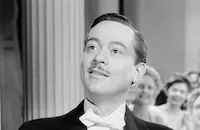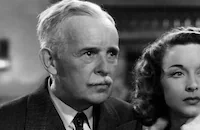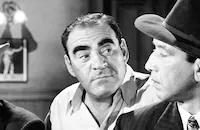One Mile from Heaven
Cast & Crew
Allan Dwan
Claire Trevor
Sally Blane
Douglas Fowley
Fredi Washington
Joan Carol
Film Details
Technical Specs

Synopsis
After she beats three male reporters from rival papers in a poker game, Lucy "Tex" Warren is tricked by them into going to a junk shop in a black neighborhood in search of a bogus murder story. While she watches with admiration as Officer Joe Dudley tap-dances with some children, Tex notices a little white girl named Sunny, whom Flora Jackson, a black seamstress, claims is her daughter. When Tex reports the incident, her editor arranges for a juvenile court hearing, and the judge postpones judgment until an investigation can be conducted. Tex offers to help Flora if she will answer her questions, but the three rival reporters invade Flora's house, and one steals a photo of Flora with Sunny as an infant. The reporters locate the photographer and then the hospital where Flora gave birth to her child. After they examine the hospital's records, their papers publish stories with the picture and state that the child really is Flora's. In prison, convict Jim Tabor notices the picture in a newspaper and tells his cellmate, Moxie McGrath, who is to be released the next day, that Sunny is the child of his deceased pal, Cliff Lucas. Tabor convinces Moxie that they can make a lot of money if Moxie can get a gun to him. After he gets out, Moxie sends Tabor a gun, but he also informs the warden of Tabor's planned escape, and Tabor is gunned down as he makes his escape attempt. Moxie then drives to Flora's home with his cohort Johnny and says that they came from the juvenile court to take the child. Tex also arrives, and after Joe tells the men that they must have a court order to take the child, Tex gets their license plate number as they leave. Tex follows them to a hotel, where she overhears Moxie call Lucas' former wife Barbara, who is celebrating her first anniversary to oilman Jerry Harrison. Moxie tells Barbara that her child, whom she thought was dead, is alive and that she can have her back if she brings $15,000 to a meeting place in a park. Tex goes to the park and sees Barbara get into a car with Moxie and Johnny. Barbara tells them that she could not get the money in time and instead offers jewels. When Johnny notices that Tex is following, Moxie pushes Barbara out of the car. Tex then calls the police and reports that her car has been stolen, giving the license plate number of Moxie's car. After the crooks' car is spotted, Moxie shoots at the police pursuing them. One of the officers shoots the tire of Moxie's car, and it crashes over a bridge, killing Moxie and Johnny. At the hearing, Barbara explains that after she secretly married Lucas, she learned that he was a criminal and tried to run away with her baby, but Lucas followed. Barbara's car crashed into a lake, and she was told that her daughter drowned. In reality, Lucas rescued the baby and had Flora, who worked at his boardinghouse, take care of her. When Lucas was killed by police, Flora did not want the baby to go to an orphanage, so she reared her as her own. Seeing Flora's strong attachment to Sunny, Barbara asks Flora to live with them as a nurse. The judge forbids Tex to publish her story, feeling that the notoriety would negatively affect Sunny. When the other reporters lock Tex into their room and demand her story, she types out a false story and then, as if she is not satisfied with her prose, throws the paper away. The reporters retrieve the paper, and their newspapers print a story that claims Sunny's real parents were a diva and a count who drowned in a car accident. The reporters are jailed for libel, and Tex visits them to say that she is returning to Waco, Texas to be the society editor of the Cattleman's Daily Bugle . She then attends a party at the Harrison estate attended by Sunny's friends from Maple Heights. Flora plans to marry Joe, who, due to Jerry's intervention, has been transferred to their area of town.

Director

Allan Dwan
Cast

Claire Trevor
Sally Blane

Douglas Fowley
Fredi Washington

Joan Carol

Ralf Harolde

John Eldredge
Paul Mcvey

Ray Walker

Russell Hopton
Chick Chandler

Eddie Anderson

Howard Hickman

Bill Robinson
Charles Wilson
George Sparks

Lon Chaney Jr.
John Lester Johnson
Fred Kelsey
Russ Clark
Robert Murphy
Eddie Dunn
Billy Mcclain
George Chandler
Tom Mcguire

Charles Lane
Frank Fanning
George Reed
Hal K. Dawson
Eric Wilton
Raymond Brown
Harry Mckee

Ralph Dunn
Ivan Miller
Lew Harvey
Floyd Criswell

Lee Phelps
Homer Dickinson
Bruce Warren
Crew
Fred Allen
Lou Breslow
Alfred Golden
Robin Harris
Herschel
Bernard Herzbrun
Samuel Kaylin
Harry M. Leonard
George Leverett
Judge Ben B. Lindsey
John Patrick
Samuel Schneider
Sidney Wagner
Sol M. Wurtzel

Film Details
Technical Specs

Quotes
Trivia
Notes
According to modern sources, in 1899, Judge Benjamin B. Lindsey, who the story on which this film is based, wrote the statute that established, in Denver, the first juvenile court in the United States. As presiding judge of the Denver juvenile court from 1900 until 1927, Lindsey instituted many reforms for the treatment of juveniles. The Twentieth Century-Fox Produced Scripts Collection at the UCLA Theater Arts Library contains Lindsey's original story, which appears to be based on fact. According to his story, Lindsey was informed that a black woman in Denver was rearing a blonde six-year-old, who claimed to be the woman's daughter. Through his investigations, Lindsey learned that the woman worked for a midwife, and that one of her responsibilities, was to burn in a furnace the bodies of babies born dead. The child in question was born to a society debutante from Chicago, and the midwife, thinking that the baby was dead, gave it to her assistant. The black woman noticed that the baby was still alive, and she nursed it to health and reared it as her own. After the story appeared in the newspapers, the real mother claimed her child and agreed to have the black woman live with them. Commenting on possible reaction to controversial aspects of the film, Box Office noted, "Although the greatest care and judgment must be exercised in exploiting this film to prevent any friction from developing over the highly detonous phases in which it cautiously touches on what appears to be racial inter-marriage, there is no reason it cannot be good box office, for it carries a tremendous appeal to all women."












